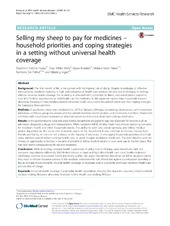Selling my sheep to pay for medicines – household priorities and coping strategies in a setting without universal health coverage
Onarheim, Kristine Husøy; Sisay, Mitike Molla; Gizaw, Muluken; Moland, Karen Marie; Norheim, Ole Frithjof; Miljeteig, Ingrid
Peer reviewed, Journal article
Published version

Åpne
Permanent lenke
https://hdl.handle.net/1956/17612Utgivelsesdato
2018-03-02Metadata
Vis full innførselSamlinger
Originalversjon
https://doi.org/10.1186/s12913-018-2943-ySammendrag
Background: The first month of life is the period with the highest risk of dying. Despite knowledge of effective interventions, newborn mortality is high and utilization of health care services remains low in Ethiopia. In settings without universal health coverage, the economy of a household is vulnerable to illness, and out-of-pocket payments may limit families’ opportunities to seek health care for newborns. In this paper we explore intra-household resource allocation, focusing on how families prioritize newborn health versus other household needs and their coping strategies for managing these priorities. Methods: A qualitative study was conducted in 2015 in Butajira, Ethiopia, comprising observation, semi-structured interviews, and focus group discussions with household members, health workers, and community members. Household members with hospitalized newborns or who had experienced neonatal death were primary informants. Results: In this predominantly rural and poor district, households struggled to pay out-of-pocket for services such as admission, diagnostics, drugs, and transportation. When newborns fell ill, families made hard choices balancing concerns for newborn health and other household needs. The ability to seek care, obtain services, and follow medical advice depended on the social and economic assets of the household. It was common to borrow money from friends and family, or even to sell a sheep or the harvest, if necessary. In managing household priorities and high costs, families waited before seeking health care, or used cheaper traditional medicines. For poor families with no money or opportunity to borrow, it became impossible to follow medical advice or even seek care in the first place. This had fatal health consequences for the sick newborns. Conclusions: While improving neonatal health is prioritized at policy level in Ethiopia, poor households with sick neonates may prioritize differently. With limited money at hand and high direct health care costs, families balanced conflicting concerns to newborn health and family welfare. We argue that families should not be left in situations where they have to choose between survival of the newborn and economic ruin. Protection against out-of-pocket spending is key as Ethiopia moves towards universal health coverage. A necessary step is to provide prioritized newborn health care services free of charge.
Utgiver
BioMed CentralTidsskrift
BMC Health Services ResearchOpphavsrett
Copyright 2018 The Author(s)Beslektede innførsler
Viser innførsler beslektet ved tittel, forfatter og emneord.
-
Attributes and consequences of health information systems data for antenatal care : Health status, health system performance and policy
Venkateswaran, Mahima (Doctoral thesis, 2019-11-05)Background: A routine health information system (RHIS) serves as an important source of data for monitoring health of clients and health system performance. All countries use RHIS data for some form of priority setting; ... -
A Critical Perspective on Mental Health News in Six European Countries: How Are “Mental Health/Illness” and “Mental Health Literacy” Rhetorically Constructed?
Van Beveren, Laura; Rutten, Kris; Hensing, Gunnel; Spyridoula, Ntani; Schønning, Viktor; Axelsson, Malin; Bockting, Claudi; Buysse, Ann; de Neve, Ine; Desmet, Mattias; Dewaele, Alexis; Giovazolias, Theodoros; Hannon, Dewi; Kafetsios, Konstantinos; Meganck, Reitske; Øverland, Simon Nygaard; Triliva, Sofia; Vandamme, Joke (Journal article; Peer reviewed, 2020)In this study, we aim to contribute to the field of critical health communication research by examining how notions of mental health and illness are discursively constructed in newspapers and magazines in six European ... -
Health managers’ views on the status of national and decentralized health systems for child and adolescent mental health in Uganda: a qualitative study
Akol, Angela; Engebretsen, Ingunn Marie S.; Skylstad, Vilde; Nalugya, Joyce; Ndeezi, Grace; Tumwine, James K. (Peer reviewed; Journal article, 2015-12-08)Background: Robust health systems are required for the promotion of child and adolescent mental health (CAMH). In low and middle income countries such as Uganda neuropsychiatric illness in childhood and adolescence represent ...
